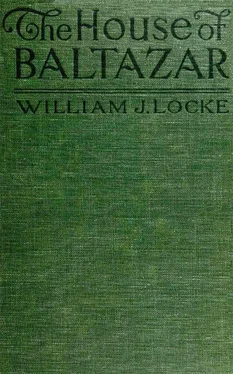William J. (John) Locke - The House of Baltazar
Здесь есть возможность читать онлайн «William J. (John) Locke - The House of Baltazar» — ознакомительный отрывок электронной книги совершенно бесплатно, а после прочтения отрывка купить полную версию. В некоторых случаях можно слушать аудио, скачать через торрент в формате fb2 и присутствует краткое содержание. Жанр: unrecognised, на английском языке. Описание произведения, (предисловие) а так же отзывы посетителей доступны на портале библиотеки ЛибКат.
- Название:The House of Baltazar
- Автор:
- Жанр:
- Год:неизвестен
- ISBN:нет данных
- Рейтинг книги:5 / 5. Голосов: 1
-
Избранное:Добавить в избранное
- Отзывы:
-
Ваша оценка:
- 100
- 1
- 2
- 3
- 4
- 5
The House of Baltazar: краткое содержание, описание и аннотация
Предлагаем к чтению аннотацию, описание, краткое содержание или предисловие (зависит от того, что написал сам автор книги «The House of Baltazar»). Если вы не нашли необходимую информацию о книге — напишите в комментариях, мы постараемся отыскать её.
The House of Baltazar — читать онлайн ознакомительный отрывок
Ниже представлен текст книги, разбитый по страницам. Система сохранения места последней прочитанной страницы, позволяет с удобством читать онлайн бесплатно книгу «The House of Baltazar», без необходимости каждый раз заново искать на чём Вы остановились. Поставьте закладку, и сможете в любой момент перейти на страницу, на которой закончили чтение.
Интервал:
Закладка:
“It is a woman and not a man who now delivers the letters in Water-End.”
Baltazar continued to laugh: “They’ll be driving the motor-cars soon.”
“I’ve seen them doing it,” said Quong Ho.
“I’m not surprised,” said his master. “They were tending that way a year ago. These new women are out for the devirilization of man. Perhaps by this time they’re in Parliament, passing firework legislation and playing the devil with all our laws and customs. You haven’t yet heard, by any chance, whether the occupation of monthly nursing is confined exclusively to the male sex?”
“The enactment, if such there be,” replied Quong Ho solemnly, “is not, to my knowledge, in force in this remote locality.”
“Let us thank the gods, Quong Ho,” said Baltazar, “that we’re out of this feminist hurly-burly. The little I saw of the movement was antipathetic to my philosophy of life. A society in which women regard the bearing of children as a physical accident of no account, and deny the responsibilities which such an event entails, must be doomed to decay, or, at the best, to bitter disillusionment. The more I hear of contemporary England the less I like it. It seems to be woman-ridden; curiously enough by two camps in apparent opposition, but in reality waging joint warfare on man. The world has never yet beheld such a sex campaign. One section demands luxury beyond the dreams of Byzantium at its rottenest, and the other claims supreme political power.”
“It is well, sir,” said Quong Ho, “that you repudiated the imbecile suggestion of the House Agent to the effect that you should employ a woman housekeeper of mature age to superintend this establishment.”
“It is lucky for you, Quong Ho, that I did,” grinned Baltazar. “She would have made you sit up.”
Quong Ho, with clasped hands and lowered head, respectfully asserted himself. “If I do not sit up sufficiently for your satisfaction, sir, it is for you to reprimand me.”
“I only spoke in jest, Quong Ho,” said Baltazar. “Our Western humour is rather subtle.”
“I will make a note of it,” replied Quong Ho.
“By such notation and accumulation of detail one gathers knowledge,” said Baltazar. “By co-ordination one acquires wisdom. Continue on this, the only path of philosophy, and your old age will be blessed. In the meantime, please keep your observations of changes at Water-End to yourself.”
“Obedience to your honourable commands, my master,” replied Quong Ho, in Chinese, “is the sacred duty of this entirely inconsiderable person. But may one so inferior as myself humbly remind your illustrious greatness that it was you who originally propounded to me a question which I was bound to answer.”
“The fact that I did so,” replied Baltazar, “you may note as an instance of the human fallibility of the sublimest minds. Fear not but that I will profit by your lesson.”
He waved a dismissing hand. Quong Ho bowed with the perfect ceremonial of pupil taking leave of master and retired. Baltazar threw himself into his arm-chair and laughed aloud.
“You’re a joy, Quong Ho. A perfect joy. A museum specimen of a joy.”
So while Baltazar delighted in the unhumorous literalness of the Chinaman, it never occurred to him that he was the dupe of the unhumorous literalness of the Chinaman’s fidelity; that while he was inveighing against speculative phenomena of an ill-understood movement, the trumpet of war had transformed that movement into an apotheosis of feminine effort of which Quong Ho, keenly intellectual, was perfectly well aware; and that it was only by the pious grace of his pupil and servant that he lived a day in his fool’s paradise.
When Quong Ho, a week afterwards, brought him his meagre mail, he angrily crushed in his fist and threw aside the enclosure of the first envelope which he had opened.
“I’m hanged if this isn’t a begging circular! It’s infernal impudence! It’s an intolerable outrage on one’s personal liberty. Here, Quong Ho!”—he swept the remainder of the mail into the Chinaman’s hand. “Don’t let me be worried with any more letters. I’ve come down here to be quiet and not to be badgered. If there are bills to pay, make out the cheques and I’ll sign them. If there are circulars, throw them away. About anything else use your discretion.”
“I will exactly execute your orders,” replied Quong Ho.
Thus Baltazar finally severed relations between himself and the outside world. Quong Ho acted the perfect Private Secretary. The only letters presented to his master for perusal were rare business communications from booksellers instructed to purchase some out-of-the-way and possibly expensive book. Circular letters, containing appeals for subscriptions, which poured in, as soon as Baltazar’s name eventually found its way on the address-lists of the neighbourhood, Quong Ho conscientiously destroyed. Using his discretion, he withheld letters from the Bank inviting investments in War Loans. Such, in his opinion, were further intrusions on the sacred privacy of his master. And thus the weeks and months passed by; and Quong Ho, in touch with even such an outpost of civilization as the tiny moorland town and bringing to that contact the most highly trained incuriosity, could not avoid gathering the current tidings of the vast world conflict; but, faithful to his commands, he said never a word to Baltazar, gave never a hint of the stupendous convulsion in which the world was involved. And while his master, serene doctrinaire, discoursed on the political science of the nineties, now being blown to smithereens by German guns, he maintained the reverential attitude of the disciple, drinking in as gospel truth the wisdom of his inspired teacher.
One evening, when Baltazar had praised the clear solution of certain problems which he had set in Differential Equations, and prophesied a glorious career for the most brilliant mathematician China had ever produced, Quong Ho, after gratefully acknowledging the encomium, said:
“If you will forgive my indiscretion, I should like to ask a question. Why is it, sir, that you, who take such great interest in the future—for example, my inconsiderable and negligible prospects, and the benefits that will accrue to humanity on the publication of the thought-shaking results of your own profound researches,—should be so indifferent to the present condition of the world?”
“For the simple reason, my good fellow,” replied Baltazar, “that, from what I have observed, the present condition of mankind—from China to Peru, as your newly found friend Dr. Johnson says—is putrescent. The best way in which we can serve mankind is to do what we’re doing now—to provide for the intellectual development of the future generation.”
“The proposition is unanswerable,” said Quong Ho. “But suppose, sir, for the sake of argument, that a philosophic observation of the civilized world as it is should result in the conclusion that, in the English idiom, it is proceeding fast to the devils—what is the duty of the man of high morality?”
“To let it go slap-dash,” said Baltazar. “The faster and surer, the better. For then the sooner will the eternal rhythm, the eternal principle of balance, assert itself. When a society is rushing down to Gadarene suicide——”
“I beg your pardon, sir,” interrupted the alert Quong Ho. “Gad—I do not understand the word.”
“Read the Gospel according to St. Mark to-morrow. You’ve heard of St. Mark?”
“You might as well ask me, sir, if I had heard of Confucius or Homer, or the immortal Todhunter of my childhood.”
Baltazar rubbed his brown thatch and turned his luminous grey eyes on his disciple.
“The immensity of your purview, Quong Ho, is only equalled by your lightning perception of landmarks. Anyhow, read St. Mark over again, and tell me your opinion of the swine of Gadara. For the moment, I’d have you know that you’ve interrupted my argument. I was saying that if everything’s going to the devil—that’s the correct idiom—not proceeding to devils——”
Читать дальшеИнтервал:
Закладка:
Похожие книги на «The House of Baltazar»
Представляем Вашему вниманию похожие книги на «The House of Baltazar» списком для выбора. Мы отобрали схожую по названию и смыслу литературу в надежде предоставить читателям больше вариантов отыскать новые, интересные, ещё непрочитанные произведения.
Обсуждение, отзывы о книге «The House of Baltazar» и просто собственные мнения читателей. Оставьте ваши комментарии, напишите, что Вы думаете о произведении, его смысле или главных героях. Укажите что конкретно понравилось, а что нет, и почему Вы так считаете.












